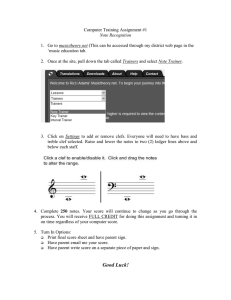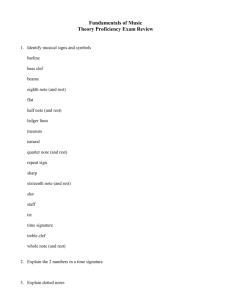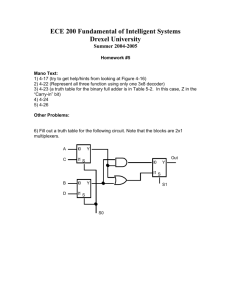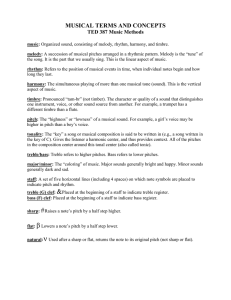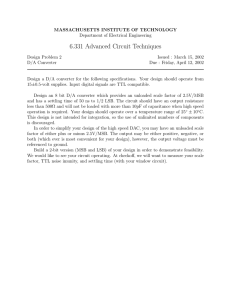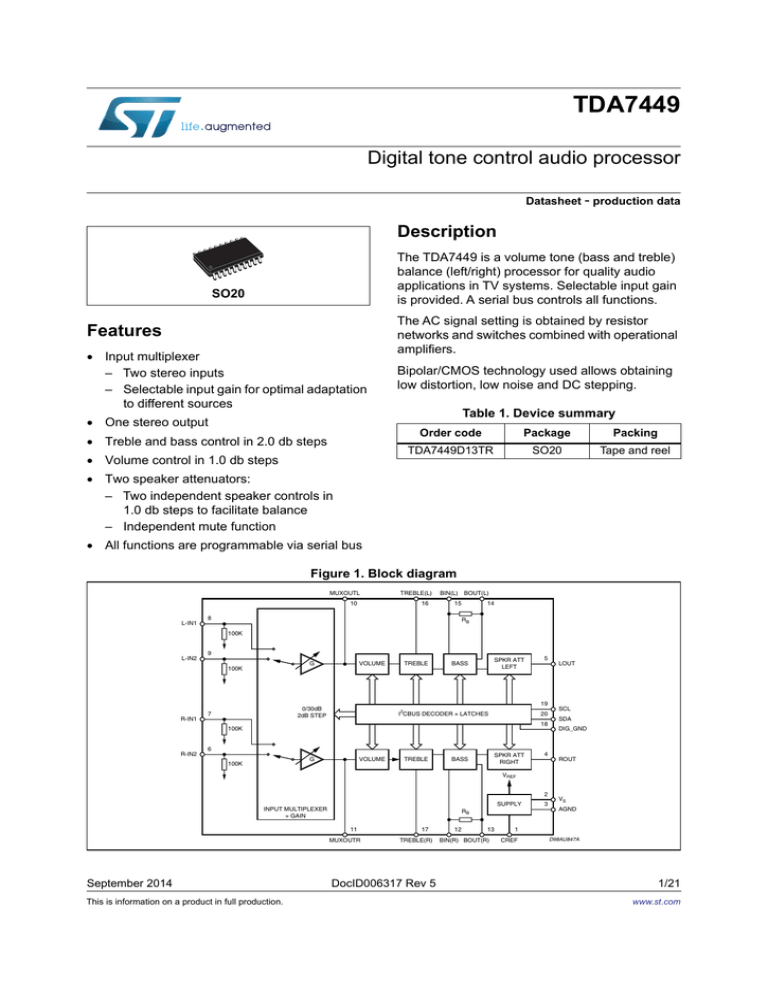
TDA7449
Digital tone control audio processor
Datasheet - production data
Description
The TDA7449 is a volume tone (bass and treble)
balance (left/right) processor for quality audio
applications in TV systems. Selectable input gain
is provided. A serial bus controls all functions.
SO20
Features
Input multiplexer
– Two stereo inputs
– Selectable input gain for optimal adaptation
to different sources
One stereo output
Treble and bass control in 2.0 db steps
Volume control in 1.0 db steps
The AC signal setting is obtained by resistor
networks and switches combined with operational
amplifiers.
Bipolar/CMOS technology used allows obtaining
low distortion, low noise and DC stepping.
Table 1. Device summary
Order code
Package
Packing
TDA7449D13TR
SO20
Tape and reel
Two speaker attenuators:
– Two independent speaker controls in
1.0 db steps to facilitate balance
– Independent mute function
All functions are programmable via serial bus
Figure 1. Block diagram
MUXOUTL
10
L-IN1
TREBLE(L)
16
BIN(L) BOUT(L)
15
8
14
RB
100K
L-IN2
9
G
100K
R-IN1
VOLUME
SPKR ATT
LEFT
BASS
I2CBUS DECODER + LATCHES
20
18
100K
R-IN2
5
19
0/30dB
2dB STEP
7
TREBLE
6
G
100K
VOLUME
TREBLE
SPKR ATT
RIGHT
BASS
4
LOUT
SCL
SDA
DIG_GND
ROUT
VREF
2
SUPPLY
INPUT MULTIPLEXER
+ GAIN
RB
11
MUXOUTR
September 2014
This is information on a product in full production.
17
TREBLE(R)
DocID006317 Rev 5
12
13
BIN(R) BOUT(R)
3
VS
AGND
1
CREF
D98AU847A
1/21
www.st.com
Contents
TDA7449
Contents
1
Overview . . . . . . . . . . . . . . . . . . . . . . . . . . . . . . . . . . . . . . . . . . . . . . . . . . 3
2
Electrical characteristics and test circuit . . . . . . . . . . . . . . . . . . . . . . . . 4
3
Application recommendations . . . . . . . . . . . . . . . . . . . . . . . . . . . . . . . . . 7
4
5
3.1
Bass, stages . . . . . . . . . . . . . . . . . . . . . . . . . . . . . . . . . . . . . . . . . . . . . . . . 7
3.2
Treble stage . . . . . . . . . . . . . . . . . . . . . . . . . . . . . . . . . . . . . . . . . . . . . . . . 7
3.3
CREF . . . . . . . . . . . . . . . . . . . . . . . . . . . . . . . . . . . . . . . . . . . . . . . . . . . . . 8
I2C bus interface . . . . . . . . . . . . . . . . . . . . . . . . . . . . . . . . . . . . . . . . . . . . 9
4.1
Data validity . . . . . . . . . . . . . . . . . . . . . . . . . . . . . . . . . . . . . . . . . . . . . . . . 9
4.2
Start and stop conditions . . . . . . . . . . . . . . . . . . . . . . . . . . . . . . . . . . . . . . 9
4.3
Byte format . . . . . . . . . . . . . . . . . . . . . . . . . . . . . . . . . . . . . . . . . . . . . . . . . 9
4.4
Acknowledge . . . . . . . . . . . . . . . . . . . . . . . . . . . . . . . . . . . . . . . . . . . . . . . 9
4.5
Transmission without acknowledge . . . . . . . . . . . . . . . . . . . . . . . . . . . . . . 9
Software specifications . . . . . . . . . . . . . . . . . . . . . . . . . . . . . . . . . . . . . 11
5.1
6
Interface protocol . . . . . . . . . . . . . . . . . . . . . . . . . . . . . . . . . . . . . . . . . . . 11
Examples . . . . . . . . . . . . . . . . . . . . . . . . . . . . . . . . . . . . . . . . . . . . . . . . . 12
6.1
No incremental bus . . . . . . . . . . . . . . . . . . . . . . . . . . . . . . . . . . . . . . . . . 12
6.2
Incremental bus . . . . . . . . . . . . . . . . . . . . . . . . . . . . . . . . . . . . . . . . . . . . 12
7
Data bytes . . . . . . . . . . . . . . . . . . . . . . . . . . . . . . . . . . . . . . . . . . . . . . . . 13
8
Package information . . . . . . . . . . . . . . . . . . . . . . . . . . . . . . . . . . . . . . . . 19
9
Revision history . . . . . . . . . . . . . . . . . . . . . . . . . . . . . . . . . . . . . . . . . . . 20
2/21
DocID006317 Rev 5
TDA7449
1
Overview
Overview
Table 2. Absolute maximum ratings
Symbol
Parameter
VS
Operating supply voltage
Tamb
Operating ambient temperature
Tstg
Storage temperature range
Value
Unit
10.5
V
0 to 70
C
-55 to 150
C
Figure 2. Pin connections
CREF
1
20
SDA
VS
2
19
SCL
PGND
3
18
DIG_GND
ROUT
4
17
TREBLE(R)
LOUT
5
16
TREBLE(L)
R_IN2
6
15
BIN(L)
R_IN1
7
14
BOUT(L)
L_IN1
8
13
BOUT(R)
L_IN2
9
12
BIN(R)
10
11
MUXOUT(R)
MUXOUT(L)
D98AU848
Table 3. Thermal data
Symbol
Rth j-pin
Parameter
Thermal resistance junction pins
Value
Unit
85
°C/W
Table 4. Quick reference data
Symbol
Parameter
Min.
Typ.
Max.
Unit
9
10.2
V
VS
Supply voltage
6
VCL
Max input signal handling
2
THD
Total harmonic distortion V = 0.1 Vrms f = 1 kHz
0.01
S/N
Signal-to-noise ratio Vout = 1 Vrms (mode = OFF)
106
dB
SC
Channel separation f = 1 KHz
90
dB
Input gain (2 dB step)
VRMS
0.1
%
0
30
dB
Volume control (1 dB step)
-47
0
dB
Treble control (2 dB step)
-14
14
dB
Bass control (2 dB step)
-14
14
dB
Balance control 1 dB step
-79
0
dB
Mute attenuation
100
DocID006317 Rev 5
dB
3/21
21
Electrical characteristics and test circuit
2
TDA7449
Electrical characteristics and test circuit
Table 5. Electrical characteristics (refer to the test circuit Tamb = 25 °C, VS = 9 V,
RL= 10 k, RG = 600 , all controls flat (G = 0 dB), unless otherwise specified)
Symbol
Parameter
Test Condition
Min.
Typ.
Max.
Unit
6
9
10.2
V
Supply
VS
Supply voltage
IS
Supply current
SVR
Ripple rejection
60
7
mA
90
dB
100
k
Input stage
RIN
Input resistance
VCL
Clipping level
THD = 0.3%
2
2.5
Vrms
SIN
Input separation
The selected input is
grounded through a 2.2 μ
capacitor
80
100
dB
-1
0
Ginmin
Minimum input gain
Ginman
Maximum input gain
30
dB
Step resolution
2
dB
Gstep
1
dB
Volume control
CRANGE
Control range
45
47
49
dB
AVMAX
Max. attenuation
45
47
49
dB
ASTEP
Step resolution
0.5
1
1.5
dB
AV = 0 to -24 dB
-1.0
0
1.0
dB
AV = -24 to -47 dB
-1.5
0
1.5
dB
AV = 0 to -24 dB
0
1
dB
AV = -24 to -47 dB
0
2
dB
adjacent attenuation steps
0
3
mV
EA
Attenuation set error
ET
Tracking error
VDC
Amute
DC step
from 0 dB to AV max
Mute attenuation
0.5
mV
80
100
dB
+12.0
+14.0
+16.0
dB
1
2
3
dB
18.75
25
31.25
K
+13.0
+14.0
+15.0
dB
1
2
3
dB
Bass control (1)
Gb
BSTEP
RB
Control range
Max. boost/cut
Step resolution
Internal feedback resistance
Treble control (1)
Gt
TSTEP
4/21
Control range
Max. boost/cut
Step resolution
DocID006317 Rev 5
TDA7449
Electrical characteristics and test circuit
Table 5. Electrical characteristics (refer to the test circuit Tamb = 25 °C, VS = 9 V,
RL= 10 k, RG = 600 , all controls flat (G = 0 dB), unless otherwise specified) (continued)
Symbol
Parameter
Test condition
Min.
Typ.
Max.
Unit
Speaker attenuators
CRANGE
Control range
76
Step resolution
SSTEP
EA
Attenuation set error
VDC
DC Step
AV = 0 to -20 dB
AV = -20 to -56 dB
0.5
1
1.5
dB
-1.5
0
1.5
dB
-2
0
2
dB
0
3
mV
adjacent attenuation steps
Mute attenuation
Amute
dB
80
100
dB
2.1
2.6
VRMS
Audio outputs
VCLIP
Clipping level
d = 0.3%
RL
Output load resistance
2
RO
Output impedance
10
VDC
DC voltage level
k
40
70
3.8
W
V
General
ENO
Et
Output noise
Total tracking error
S/N
Signal-to-Noise ratio
SC
Channel separation left/right
d
Distortion
All gains = 0dB;
BW = 20Hz to 20KHz flat
5
15
μV
AV = 0 to -24dB
0
1
dB
AV = -24 to -47dB
0
2
dB
All gains 0dB; VO = 1VRMS ;
80
AV = 0; VI = 1VRMS ;
106
dB
100
dB
0.01
0.08
%
1
V
Bus input
Note:
VIL
Input low voltage
VIH
Input high voltage
IIN
Input current
VIN = 0.4 V
VO
Output voltage SDA
acknowledge
IO = 1.6 mA
3
V
-5
0.4
5
μA
0.8
V
1. The device is functionally good at Vs = 5 V. A step down on Vs to 4 V doesn’t reset the
device.
2. Bass and treble response: the center frequency and the response quality can be chosen
by the external circuitry.
DocID006317 Rev 5
5/21
21
Electrical characteristics and test circuit
TDA7449
Figure 3. Test circuit
R2 2K
C9
5.6nF
150nF
J5
C7
TREBLE(L)
MUXOUTL
IN1L
J3
10
RCA
1
2
J4
3
4
5
330nF
16
C8
BIN(L)
BOUT(L)
15
14
GND
IN2L
GND
L-IN1
OUT_L
100K
C3 0.47μF
L-IN2
RB
8
5
9
OUT_ R
LOUT
100K
C4 0.47μF
CON3
G
VOLUME
TREBLE
SPKR ATT
LEFT
BASS
J2
RCA
0/30dB
2dB STEP
J1
2
3
4
IN2R
GND
IN1R
GND
R-IN2
18
DIG_GND
19
SCL
20
SDA
G
VOLUME
TREBLE
BASS
SPKR ATT
RIGHT
4
CON4
2
3
J6
4
C2 0.47μF
100K
SUPPLY
MOUTL
GND
RB
11
MUXOUTR
TREBLE(R)
MOUTR
13
BOUT(R)
C5
150nF
R1
1
DocID006317 Rev 5
1
+9V
CREF
C6
330nF
2K
C12
22μF
+V8
GND
C10
5.6nF
C13
100nF
R3 30
AGND
VS
12
17
2
C11
10μF
D98AU849A
6/21
1
ROUT
7
BIN(R)
3
J10
4
4
3
2
3
CON4
100K
INPUT MULTIPLEXER
+ GAIN
1
2
VREF
CON
J5
JP1
JUMPER
6
C1 0.47μF
R-IN1
I2CBUS DECODER + LATCHES
1
CON4
+9 V
IN1R
1
J9
OUT_L
GND
IN1L
J8
OUT_R
GND
2
CON2
J7
TDA7449
3
Application recommendations
Application recommendations
The first and the last stages are volume control blocks. The control range is 0 to -47 dB
(mute) for the first one and 0 to -79 dB (mute) for the last one. Both of them have 1 dB step
resolution. The very high resolution allows the implementation of systems free from any
noisy acoustical effect. The TDA7449 audio processor provides dual-band tone control.
Typical responses are shown in Figure 5 through 9.
3.1
Bass stage
The bass cell has an internal resistor Ri = 25 k typical. Several filter types can be
implemented, connecting external components to the bass IN and OUT pins. Figure 4 refers
to a basic T-type bandpass filter. The filter component values R1 internal FC, the gain AV at
max. boost and the filter Q factor are calculated as given below.
Figure 4. T bandpass filter
Ri internal
IN
OUT
C1
C2
R2
D95AU313
1
F C = ----------------------------------------------------------------2 R1 R2 C1 C2
R2C2 + R2C1 + RiC1
A V = -----------------------------------------------------------R2C1 + R2C2
R1 R2 C1 C2
Q = ------------------------------------------------R2C1 + R2C2
Once the FC, AV, and Ri internal values are fixed, the external component values will be:
AV – 1
C1 = ----------------------------------------2 Fc Ri Q
2
Q C1
C2 = -----------------------------2
AV – 1 – Q
2
AV – 1 – Q
R2 = --------------------------------------------------------------------2 C1 Fc A V – 1 Q
3.2
Treble stage
The treble stage is a high-pass filter whose time constant is fixed by an internal resistor
(25 k typical) and an external capacitor connected between the treble pins and ground.
3.3
CREF
The recommended 10 μF reference capacitor (CREF) value can be reduced to 4.7 μF if the
application requires faster power ON.
DocID006317 Rev 5
7/21
21
Application recommendations
TDA7449
Figure 5. THD vs. frequency
Figure 6. Bass response
Figure 7. THD vs. RLOAD
Figure 8. Treble response
Figure 9. Channel separation vs. frequency
8/21
DocID006317 Rev 5
I2C bus interface
TDA7449
4
I2C bus interface
Data transmission from the microprocessor to the TDA7449 and vice versa takes place
through the 2-wire I2C bus interface, consisting of the two lines SDA and SCL (pull-up
resistors to the positive supply voltage must be connected).
4.1
Data validity
As shown in Figure 10, the data on the SDA line must be stable during the high period of the
clock. The HIGH and LOW state of the data line can only change when the clock signal on
the SCL line is LOW.
4.2
Start and stop conditions
As shown in Figure 11, a start condition is a HIGH-to-LOW transition of the SDA line while
SCL is HIGH. The stop condition is a LOW-to-HIGH transition of the SDA line while SCL is
HIGH.
4.3
Byte format
Every byte transferred on the SDA line must contain 8 bits. Each byte must be followed by
an acknowledge bit. The MSB is transferred first.
4.4
Acknowledge
The master (μP) puts a resistive HIGH level on the SDA line during the acknowledge clock
pulse (see Figure 12). The peripheral (audio processor) that acknowledges has to pull down
(LOW) the SDA line during this clock pulse.
The audio processor which has been addressed has to generate an acknowledge after the
reception of each byte, otherwise the SDA line remains at the HIGH level during the ninth
clock pulse time. In this case the master transmitter can generate the STOP information in
order to abort the transfer.
4.5
Transmission without acknowledge
Instead of detecting the acknowledge from the audio processor, the μP can use a simpler
transmission which is to simply wait one clock pulse without checking the slave
acknowledge and send the new data.
This is of course a riskier approach.
DocID006317 Rev 5
9/21
21
I2C bus interface
TDA7449
Figure 10. Data validity on the I2C bus
SDA
SCL
DATA LINE
STABLE, DATA
VALID
CHANGE
DATA
ALLOWED
D99AU1031
Figure 11. Timing diagram of I2C bus
SCL
I2CBUS
SDA
D99AU1032
START
STOP
Figure 12. Acknowledge on the I2C bus
SCL
1
2
3
7
8
9
SDA
MSB
START
10/21
D99AU1033
DocID006317 Rev 5
ACKNOWLEDGMENT
FROM RECEIVER
TDA7449
Software specifications
5
Software specifications
5.1
Interface protocol
The interface protocol comprises:
A start condition (S)
A chip address byte, containing the TDA7449 address
A subaddress byte
A sequence of data (N byte + acknowledge)
A stop condition (P)
Figure 13. Interface protocol
SUBADDRESS
CHIP ADDRESS
MSB
S
1
LSB
0
0
0
1
0
0
0
MSB
ACK
X
DATA 1 to DATA n
LSB
X
X
B
DATA
MSB
ACK
LSB
DATA
ACK
P
D96AU420
ACK = Acknowledge
S = Start
P = Stop
A = Address
B = Auto-increment
DocID006317 Rev 5
11/21
21
Examples
TDA7449
6
Examples
6.1
No incremental bus
The TDA7449 receives a start condition, the correct chip address, a subaddress with B = 0
(no incremental bus), N-data (all these data concern the subaddress selected), a stop
condition.
Figure 14. No incremental bus (B = 0)
SUBADDRESS
CHIP ADDRESS
MSB
S
1
LSB
0
0
0
1
0
0
0
MSB
ACK
X
DATA
LSB
X
X
MSB
0 D3 D2 D1 D0 ACK
LSB
DATA
ACK
P
D96AU421
6.2
Incremental bus
The TDA7449 receives a start condition, the correct chip address, a subaddress with B = 1
(incremental bus): now it is in a loop condition with an autoincrease of the subaddress
whereas SUBADDRESS from "XXX1000" to "XXX1111" of DATA are ignored.
DATA 1 concern the subaddress sent, and DATA 2 concerns the subaddress sent plus one
in the loop etc, and at the end it receives the stop condition.
Figure 15. Incremental bus (B=1)
CHIP ADDRESS
SUBADDRESS
MSB
S
1
LSB
0
0
0
1
0
0
0
MSB
ACK
X
DATA 1 to DATA n
LSB
X
X
1 D3 D2 D1 D0 ACK
MSB
LSB
DATA
ACK
D96AU422
Table 6. Power-on reset condition
12/21
Input selection
IN2
Input gain
28 dB
Volume
Mute
Bass
0 dB
Treble
2 dB
Speaker
Mute
DocID006317 Rev 5
P
TDA7449
7
Data bytes
Data bytes
Address = 88 hex (Addr: OPEN)
Table 7. Function selection: first byte (subaddress)
MSB
LSB
Subaddress
D7
D6
D5
D4
D3
D2
D1
D0
X
X
X
B
0
0
0
0
Input select
X
X
X
B
0
0
0
1
Input gain
X
X
X
B
0
0
1
0
Volume
X
X
X
B
0
0
1
1
Not allowed
X
X
X
B
0
1
0
0
Bass
X
X
X
B
0
1
0
1
Treble
X
X
X
B
0
1
1
0
Speaker attenuate "R"
X
X
X
B
0
1
1
1
Speaker attenuate "L"
B = 1: incremental bus active
B = 0: no incremental bus
X = don’t care
Table 8. Input selection
MSB
LSB
Input multiplexer
D7
D6
D5
D4
D3
D2
D1
D0
X
X
X
X
X
X
0
0
Not allowed
X
X
X
X
X
X
0
1
Not allowed
X
X
X
X
X
X
1
0
IN2
X
X
X
X
X
X
1
1
IN1
DocID006317 Rev 5
13/21
21
Data bytes
TDA7449
Table 9. Input gain selection
MSB
D7
D6
D5
D4
LSB
Input gain
D3
D2
D1
D0
2 dB steps
0
0
0
0
0 dB
0
0
0
1
2 dB
0
0
1
0
4 dB
0
0
1
1
6 dB
0
1
0
0
8 dB
0
1
0
1
10 dB
0
1
1
0
12 dB
0
1
1
1
14 dB
1
0
0
0
16 dB
1
0
0
1
18 dB
1
0
1
0
20 dB
1
0
1
1
22 dB
1
1
0
0
24 dB
1
1
0
1
26 dB
1
1
1
0
28 dB
1
1
1
1
30 dB
Gain = 0 to 30 dB
Table 10. Volume selection
MSB
D7
D6
D5
D4
D3
Volume
D2
D1
D0
1 dB steps
0
0
0
0 dB
0
0
1
-1 dB
0
1
0
-2 dB
0
1
1
-3 dB
1
0
0
-4 dB
1
0
1
-5 dB
1
1
0
-6 dB
1
1
1
-7 dB
0
0
0
0
0 dB
0
0
0
1
-8 dB
0
0
1
0
-16 dB
0
0
1
1
-24 dB
0
1
0
0
-32 dB
0
1
0
1
-40 dB
X
1
1
1
X
Volume = 0 to 47dB/mute
14/21
LSB
DocID006317 Rev 5
X
X
Mute
TDA7449
Data bytes
Table 11. Bass selection
MSB
D7
D6
D5
D4
LSB
Bass
D3
D2
D1
D0
2 dB steps
0
0
0
0
-14 dB
0
0
0
1
-12 dB
0
0
1
0
-10 dB
0
0
1
1
-8 dB
0
1
0
0
-6 dB
0
1
0
1
-4 dB
0
1
1
0
-2 dB
0
1
1
1
0 dB
1
1
1
1
0 dB
1
1
1
0
2 dB
1
1
0
1
4 dB
1
1
0
0
6 dB
1
0
1
1
8 dB
1
0
1
0
10 dB
1
0
0
1
12 dB
1
0
0
0
14 dB
LSB
Treble
D0
2 dB steps
Table 12. Treble selection
MSB
D7
D6
D5
D4
D3
D2
D1
0
0
0
0
-14 dB
0
0
0
1
-12 dB
0
0
1
0
-10 dB
0
0
1
1
-8 dB
0
1
0
0
-6 dB
0
1
0
1
-4 dB
0
1
1
0
-2 dB
0
1
1
1
0 dB
1
1
1
1
0 dB
1
1
1
0
2 dB
1
1
0
1
4 dB
1
1
0
0
6 dB
1
0
1
1
8 dB
1
0
1
0
10 dB
1
0
0
1
12 dB
1
0
0
0
14 dB
DocID006317 Rev 5
15/21
21
Data bytes
TDA7449
Table 13. Speaker attenuation selection
MSB
D7
D6
D5
D4
D3
Speaker attenuation
D2
D1
D0
1 dB
0
0
0
0 dB
0
0
1
-1 dB
0
1
0
-2 dB
0
1
1
-3 dB
1
0
0
-4 dB
1
0
1
-5 dB
1
1
0
-6 dB
1
1
1
-7 dB
0
0
0
0
0 dB
0
0
0
1
-8 dB
0
0
1
0
-16 dB
0
0
1
1
-24 dB
0
1
0
0
-32 dB
0
1
0
1
-40 dB
0
1
1
0
-48 dB
0
1
1
1
-56 dB
1
0
0
0
-64 dB
1
0
0
1
-72 dB
1
1
1
1
X
Speaker attenuation = 0 to -79dB/mute
16/21
LSB
DocID006317 Rev 5
X
X
Mute
TDA7449
Data bytes
Figure 16. Pin 1
Figure 17. Pins 10, 11
VS
VS
VS
VS
20μA
20K
CREF
MUXOUT
20K
GND
D96AU491
D96AU430
Figure 18. Pins 4, 5
Figure 19. Pins 12, 15
VS
VS
20μA
24
ROUT
LOUT
20μA
25K
BIN(L)
BIN(R)
D96AU434
Figure 20. Pins 6, 7, 8, 9
D98AU850
Figure 21. Pins 13, 14
VS
VS
20μA
20μA
IN
100K
VREF
44K
BOUT(L)
D96AU425
BOUT(R)
DocID006317 Rev 5
D96AU429
17/21
21
Data bytes
TDA7449
Figure 22. Pins 16, 17
Figure 23. Pin 20
VS
20μA
20μA
SDA
TREBLE(L)
TREBLE(R)
50K
D96AU433
Figure 24. Pin 19
20μA
SCL
D96AU424
18/21
DocID006317 Rev 5
D96AU423
TDA7449
8
Package information
Package information
In order to meet environmental requirements, ST offers these devices in different grades of
ECOPACK® packages, depending on their level of environmental compliance. ECOPACK®
specifications, grade definitions and product status are available at: www.st.com.
ECOPACK® is an ST trademark.
Figure 25. SO20 mechanical data & package dimensions
mm
inch
DIM.
MIN.
TYP.
MAX.
MIN.
TYP.
MAX.
A
2.35
2.65
0.093
0.104
A1
0.10
0.30
0.004
0.012
B
0.33
0.51
0.013
0.200
C
0.23
0.32
0.009
0.013
D (1)
12.60
13.00
0.496
0.512
E
7.40
7.60
0.291
e
1.27
0.299
0.050
H
10.0
10.65
0.394
0.419
h
0.25
0.75
0.010
0.030
L
0.40
1.27
0.016
0.050
k
ddd
OUTLINE AND
MECHANICAL DATA
0˚ (min.), 8˚ (max.)
0.10
0.004
(1) “D” dimension does not include mold flash, protusions or gate
burrs. Mold flash, protusions or gate burrs shall not exceed
0.15mm per side.
SO20
0016022 D
DocID006317 Rev 5
19/21
21
Revision history
9
TDA7449
Revision history
Table 14. Document revision history
Date
03-Sep-2014
20/21
Revision
5
Changes
Removed DIP20 package option
Updated Table 1: Device summary
Revised document presentation along with minor textual
updates and modification of title
DocID006317 Rev 5
TDA7449
IMPORTANT NOTICE – PLEASE READ CAREFULLY
STMicroelectronics NV and its subsidiaries (“ST”) reserve the right to make changes, corrections, enhancements, modifications, and
improvements to ST products and/or to this document at any time without notice. Purchasers should obtain the latest relevant information on
ST products before placing orders. ST products are sold pursuant to ST’s terms and conditions of sale in place at the time of order
acknowledgement.
Purchasers are solely responsible for the choice, selection, and use of ST products and ST assumes no liability for application assistance or
the design of Purchasers’ products.
No license, express or implied, to any intellectual property right is granted by ST herein.
Resale of ST products with provisions different from the information set forth herein shall void any warranty granted by ST for such product.
ST and the ST logo are trademarks of ST. All other product or service names are the property of their respective owners.
Information in this document supersedes and replaces information previously supplied in any prior versions of this document.
© 2014 STMicroelectronics – All rights reserved
DocID006317 Rev 5
21/21
21

